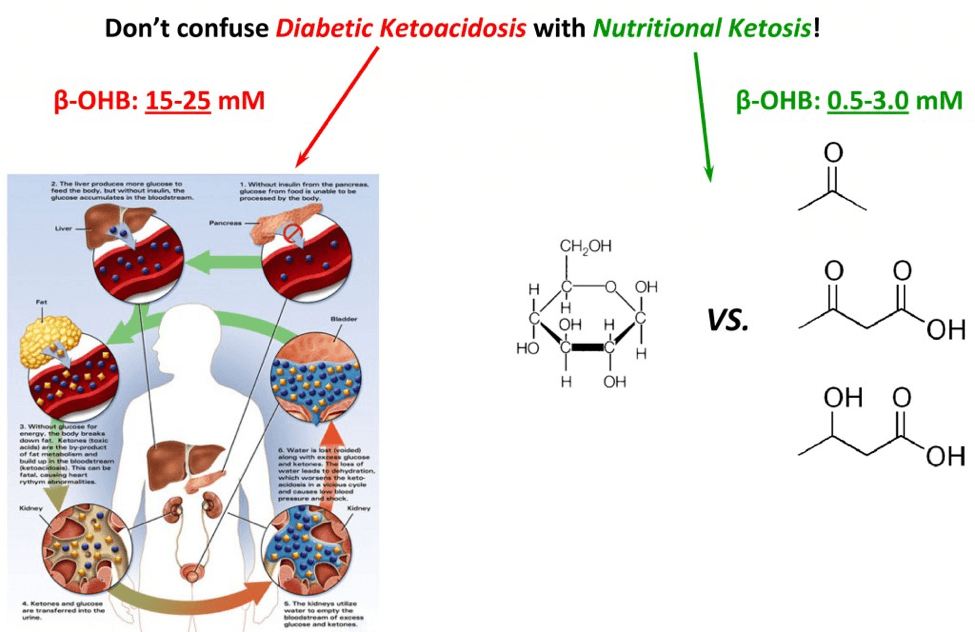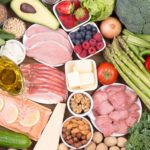You may have heard from your doctor that ketosis is a life-threatening condition. If so, your doctor is confusing diabetic ketoacidosis (DKA) with nutritional ketosis, or keto-adaptation.
First, some semantics. Our body can produce, from fat and some amino acids, three ketone bodies (a “ketone” refers to the chemical structure where oxygen is double-bonded to carbon sandwiched between at least 2 other carbons). These ketone bodies we produce are: acetone, acetoacetone, and beta-hydroxybutyrate (B-OHB). [For anyone who is interested, they are the 3 most right structures on the figure, below.]
Why do we make ketones? For starters, it’s a vital evolutionary advantage. Our brain can only function with glucose and ketones. Since we can’t store more than about 24 hours’ worth of glucose, we would all die of hypoglycemia if ever forced to fast for more than a day. Fortunately, our liver can take fat and select amino acids (the building blocks of proteins) and turn them into ketones, first and foremost to feed our brains. Hence, our body’s ability to produce ketones is required for basic survival.
What is diabetic ketoacidosis? When diabetics (usually Type I diabetics, but sometimes this occurs in very late-stage, insulin-dependent, Type II diabetics) fail to receive enough insulin, they go into an effective state of starvation. While they may have all the glucose in the world in their bloodstream, without insulin, they can’t get any into their cells. Hence, they are effectively going into starvation. The body does what it would do in anyone – it starts to make ketones out of fat and proteins. Here’s the problem: the diabetic patient in this case can’t produce any insulin, so there is no feedback loop and they continue to produce more and more ketones without stopping. By the time ketone levels (specifically, beta-hydroxybutyrate) approach 15 to 25 mM, the resulting pH imbalance leads to profound metabolic derangement and the patient is critically ill.
But this state of metabolic derangement is not actually possible in a person who can produce insulin, even in small amounts. The reason is that a feedback loop prevents the ketone level from getting high enough to cause the change in pH that leads to the cascade of bad problems. A person who is said to be “keto-adapted,” or in a state of nutritional ketosis, generally has beta-hydroxybutyrate levels between about 0.5 and 3.0 mM. This is far less than the levels required to cause harm through acid-base abnormalities.
Keto-adaption is a state, achieved through significant reduction of carbohydrate intake (typically to less than 50 grams per day) and moderate protein, where the body changes from relying on glycogen as its main source of energy to relying on fat. Specifically, the brain shifts from being primarily dependent on glucose, to being primarily dependent on beta-hydroxybutyrate. This has nothing to do with what a diabetic patient is experiencing in DKA, but does illustrate how poorly informed and quick to react the medical community is. DKA and nutritional ketosis (or keto-adaptation) have as much in common as a house fire and a fireplace.
Photo by Andrew Yardley on Unsplash








Question:
47yo female, on ketogenic diet since 12/1/2012 with no problems, carb levels 20-40 daily, restricted dairy, cautionary protein levels. When with friends I may occasional have 2-4 drinks totaling no more than 5 carbs cumulatively over a 4 hour period. I am comfortable driving if need be. Recently, though, I read that this diet causes the ketones to change to isopropyl alcohol that is not separated out in a breathalyzer machine from ethanol (drinking alcohol) and the diet combined with low carb alcohol can cause you to continue to burn ketones thus elevating the result of a BAC taken with a breathalyzer. I have been advised if ever in that situation to request poste haste a blood alcohol test by needle, which will segregate the ethanol from the converted ketones. Have you had experience with this phenomenon? 2011 State of Georgia v. Redstrom covers this specifically – it seems pertinent information for those choosing ketogenic lifestyles to be aware of if there is merit?
I am not aware of this. Interesting, if true. One more reason not to drink and drive.
Hey,
I was wondering if there is any link between a ketogenic diet and high alkaline Phosphotase (ALP) values. From my limited wikipedia knowledge this enzyme seems to be involved in the digestion of fat in the liver.
Thanks,
Matz
I guess anything is possible in some % of the population, but this is not a common pattern seen (I assume you’re asking about high serum alk phos).
Question:
What might be the dangers of a very strick raw vegan diet for someone who actually desires to enter ketosis while fasting and engaging in that kind of diet? Our son has just done a very strict 3-day liquid fast and now has very little appetite and is only eating small quantities of organic raw fruits and vegetables. He believes that ketosis under these conditions is beneficial and he says that he has been eliminating parasites and toxins. He has been following a Youtube raw vegan guru who touts the healing powers of this sort of diet to cure seemingly everything. How dangerous is this?
Very interesting reading. Thank you.
I have been sugar free before and it was wonderful for years. This year I got it back on track. First I moved to 3 regular meals a day, no snacks, only good whole foods but keeping in the chocolate/dried fruit/fruit after meals. That gave me structure.
Then I took out the chocolate AND the fruit. That cut the addiction which is wonderful,. No more cravings, sugar addiction symptoms, driving out to buy the chocolate etc etc. However as I’d never gone as far before (fruit had to go too as I over eat it massively) I had appalling “candida die off” (I fit every symptom of that) and the worst day was about day 21 (!!!) of coming off fruit/sugar. Then suddenly I woke up not feeling dreadful and exhausted any more. I lost virtually no weight – may be one pound over 2 weeks despite giving up all the fruit and chocolate and not eating more of anything else (I never have milk or cheese or wheat products and hate alcohol and caffeine). I only drink water.
Only then did I give up my brown rice and baked potato/sweet potato. So I have done 3 days low carb so far. I seem to be able to continue with it because I healed the sugar/fruit addiction first before I took out the brown/good carbs. That is why it seems to be working as I don’t have sugar withdrawal as it was already taken out.
Also the good bit for me with 30 pounds to lose (which makes me feel so bad it even puts me off going on dates at the moment) I have actually lose some weight immediately in the last 3 days eating like this. I have lots of veg at lunch and dinner, swede, peppers, aubergine, (and spinach with butter every day – my only dairy). I was surprised yesterday’s calories were 1000 when normally with the potato etc they are nearer 2000 and I did not feel hungry either. (I am the person who ate just as extras 1000 calories of nut and raisins at a time or had the daily 500 calorie trip to the coffee shop to buy hot chocolate and chocolates. So for once in about 3 years it feels possible to lose the weight.
I tried a ketosis strip yesterday but it just looked normal colour and yet the Spakrpeople food analysis of yesterday’s food had hardly any carb in the veg.
Anyway thanks for the great thread.
Hello Dr. Attia,
Amazing thread. I am addicted. I used to eat what is considered a low fat, well balanced diet and eventually cut down to an extremely low caloric daily intake. I’ve eaten like this for years and all that has happened is that over time I have become at least 45 lbs overweight. I would consider myself fit but overweight. Two weeks ago after stumbling upon your eating academy website and this thread, I began a high fat low carb diet and have lost 9 lbs with relatively no negative symptoms. I want to continue this way of eating, but still worry about the long term impact of a high fat diet. Is there something I am missing? While most skeptics seem to focus on sustainability of such a diet, my concern is the negative health effects of too much fat intake. What does the body do with excess fat that we ingest?
Hopefully low carb – high fat for life. Thank you so much for this thread.
Victor, you might find the post (with talk) “how did we come to believe saturated fat is bad for us” interesting and helpful.
Hi Peter,
First off, thanks for this blog. It’s extremely informative.
I’m on day 12 of ketoadaptation, eating less than 20g net carbs per day, mostly in the form of carrots, broccoli, and cauliflower. For the last day or so, I’ve been experiencing some mild but recurring chest pain – a dull throb in the sternum that lasts for a few seconds and then disappears. I’m a 27 y/o male, generally fit with no serious medical conditions – so this is a bit worrisome. I realize its difficult to assess a symptom of this nature without knowing more about my medical history and status – just wondering if you’ve experienced or have heard of anything of this nature with regards to the first few weeks of ketoadaptation.
Thanks for any feedback you can provide.
Jordan, probably worth sharing with your doctor. Not something I have seen in ketosis.
Hi there, I’m looking for advise. I have been sugar free for a good 6 months and feeling better, losing weight etc etc and recently diagnosed (1 week ago) with Type 1 diabetes (I’m also 37yr old, work as a physiotherapist and exercise daily). My hospital based dietitian completed a food diary with me and advised me that I need more carb’s especially with now having injections of insulin, so have gone back to cereals in the morning, eating some bread. My stomach is now bloated and sore, blood sugars still all over the place. What’s your opinion/advise about diet for type 1’s? any carb’s better?
Hi Christina, I’m not Peter and I’m certainly no expert, but if you would like some more info, you might try Richard Bernstein’s book on diabetes and diet:
https://www.amazon.com/Dr-Bernsteins-Diabetes-Solution-Achieving/dp/0316182699/ref=sr_1_1?s=books&ie=UTF8&qid=1372080802&sr=1-1&keywords=richard+bernstein
He’s a Type 1 diabetic and an MD specializing in diabetes. Peter has occasionally mentioned his work. (His recommendation is low carb, by the way.)
Again, I’m not a doctor, not Peter, not any kind of expert, and cannot give advice. But you may find his perspective useful. I hope it helps you.
Ahhh…yes. The same thing happened to me! They had me eating more food than I could possibly eat. Looking back I still find it hard to believe they wanted me to eat so much! Like the guy above me said, I’m no doctor, but I have been through that and have found the advice to be the worst advice I have ever received.
The only thing that is true is that once you are on insulin, you tend to need some complex carbs because they tend to make you less likely to go into shock. Your situation is difficult because your insulin dosage is prescribed by your physician for this particular diet. I can’t tell you what to do, but I can tell you what I did.
I stopped taking insulin completely and changed to an all vegetable and low meat diet plus plenty of supplements to lower blood sugar. I drink cinnamon tea instead of water; nopal leaf; gymnema leaf; bitter melon; neem tea; vandyl sulfate; chromium piccolinate; magnesium; and gentle yoga. Most of the time it keeps me under the 200’s. If it doesn’t, then I take small amounts of insulin. I use humilin because it has the least amount of additives and its over the counter. In case I reach low numbers I eat an apple since it is both sweet and starchy. It is more likely to bring your numbers up without sending you [way the hell] over the top. Its all risky business because as opposed to taking the processed god-knows-what glucose tablets your blood sugar may not rise fast enough to keep you from having a medical emergency. In my experience, the trick to not have numbers all over the place is to take the least amount of insulin needed to stay inside your acceptable range.
Hi Peter,
Just found this site. What a brilliant job you’re doing, helping so many people. Wonder if you could give me a bit of advice please? I have bladder cancer (CIS – clear at the mo through BCG installations every 3 months). I have asked about an optimum diet to help, but am just told to eat healthily, which I have always done anyway (more or less!). I have read about a ketogenic diet and various others and I get very confused, as they seem to contradict each other. Is it true that if you are in ketosis cancer cells cant reproduce, as they cant use ketones for reproduction, only sugar? I have altered my diet to cut out as much carb as poss, living primarily on protein (chicken & fish in the main), vegetables and fruit. I havent tested myself though, so have no idea of levels. I was told good carbs were fine, so Im very confused right now! My bladder is very inflamed through constant interference, so I want to adapt my diet for that also. Any advice you can give me would be much appreciated.
Regards,
Deborah
Deborah, I do plan to do a post on cancer. Short answer is we don’t have enough insight to say definitively. I do have a hard time imagining any scenario where cancer outcomes would be better on a diet full of sugar and simple carbs, though.
Hi,
Wondering if ketogenic diet (the high fat part) might be contra-indicated in someone with a tendency to develop high triglycerides (eg 8-10mmol/L)? Not necessarily have them that high all the time but can get that high if diet is off. And not talking about an obese person or alcohol drinker, just a poor fat clearer eg Apo E2/E4. Or would the body increase clearance if low carbs?
Thanks
Reginald, I do there are folks in whom KD is not a good idea, though I don’t know what the trait or traits is/are in them making this so. It might be apoCII polymorphisms?
Having type 1 diabetes I have reached some very high levels of ketones and found it interesting that it never lead to acidosis. I have read that people with diabetes tend to have acidic bodies and I took on measuring my pH regularly for some time. Never once did I see a low reading, if anything it tends to be seemingly high. The only explanation I can find is that my diet is very rich in vegetables. In a way it was sort of a disappointment. I have been in search for solutions to my increasing web of health problems and was hoping it would be something as simple as pH.
On a side note, I saw your discussion on TED (as probably many other people did). I am surprised you never mentioned anything about the effects of additives like MSG (injected into lab rats to cause type two diabetes) or aspartame in the effects of obesity and diabetes. Or the obvious effects of pesticides and arsenic (regularly fed to chickens to plump them up) in causing type two diabetes and obesity. There are published experiments that show that once a blood pesticide concentration is controlled for there is no relationship between obesity and type two diabetes. I really thought that this was what your TED talk was going to be about. I really hope you are looking into this in your research.
Hey there Peter, I know someone asked the bowel movement question but my wife generally suffers from this. I was hoping to see an improvement as we are both finishing our first week working towards ketosis. She usually tries to keep the salads a regular meal additional but was wondering if you or anyone have any recommendations on how to remediate this? Thanks for your time.
For the time being we’ll keep leafy greens coming, lots of water and turns out fat intake was a bit lower than what it should be so will adjust those accordingly.
And salt, ideally delivered in bouillon helps, too. MCT is very powerful, also, but in small doses.
Hello Peter, I’m on low carb diet over a year now. Inspired by your blog I spend few days doing intense measurements of B-OHB and glucose levels, adding MCT/Coconut oil at the same time. What I observed is that when B-OHB level went up from 0.8 to 3+ my glucose levels dropped to values I never saw before. I used to be extremely hungry with 4.6 and strong headache, now few days later I’m not in hurry to eat with glucose 3.4 and ketones in 4-5 range, and no headache. My morning glucose levels also did fall from 5.6-6.1 (usually the highest in a day) to 4.6.
I suspect it’s the effect of inhibiting glucagon from high ketone levels. And I read that glucagon actually might cause headache and increased glucose level from gluconeogenesis. Possiby it’s also quick method to avoid “ketosis flu”?
Could it be that metabolism can run in number of stable operating points and with MCT you can actually quickly and easily switch from one to the other? Did you found any research papers about it?
Hi Peter,
Thanks for this interesting article. I recently had a blood test for beta-hydroxybutyrate and it is 1.07 mM or mmol/L. My doctor thinks this could be sign of an inborn error of metabolism and wants to do additional testing. The standard laboratory range is .02-.27 mmol/L or mM. I eat a diet high in good fats with relatively low carbs. I eat ample amounts of coconut oil, coconut butter, and coconut meat and I have heard that coconut oil produces even more ketones than other fats. Point being that I doubt that this level of beta-hydroxybutyrate is concerning. Would you agree? Also, I wanted to make sure that levels you are discussing in your article are blood levels, right?
Correct, I always refer to blood levels of B-OHB in mM. A level of 1 mM is completely “normal” for someone eating fewer than about 50 gm/day of CHO.
Hi Dr. Attia, I wonder if you could help me understand an question about ketosis that a friend has suggested. She cited studies where epileptic children on ketogenic diets developed kidney stones at a fairly high rate: 6% in the first year and 25% after 5 years. She warned that staying in ketosis for long periods of time could cause kidney stones, yet I have been in ketosis for almost 15 years! I am a voracious reader and happen to know that kidney stones are not typical in those who are on low carb diets.
Can you think of an explanation of why epileptic children on these diets would have such a high rate of kidney stones? One notable fact from these studies was that they reduced water intake in the epileptic subject to 80% of normal intake. Is that the answer?
Very likely. It could also represented an easy-to-correct failure to appropriately supplement something like calcium citrate, if appropriate.
Hello Dr
I believe I have been keto-adaptive for about three months (through measuring urine). I recently purchased a ketone blood test unit and my morning ketones for past five days have been between 3.7 – 4.3. I eat about 60g protein and about 30g carbs. Fat is via normal fats in meats, heavy cream, home made mayonnaise, avocados and coconut oil throughout the day. I haven’t lost weight in about 21 days (want to lose about 6kg). My questions – is it possible that the coconut oil is generating a ‘false’ reading of ketones? If coconut oil creates more ketones, is taking 3 tablespoons of c/nut oil the same as lowering carbs/proteins (which leads to the high reading on the ketone meter). Does high coconut oil which leads to higher ketones mean a higher fat burning? (I’m a 56 yo woman.)
Read the post I just wrote today. Perfect timing of your question.
Hi Peter,
Thanks for addressing my question. It is appreciated! I had one further question. When you mention that ketosis happens when you eat less than 50 grams carbs a day, are you referring to net carbs (minus the fiber grams I mean)? Thanks in advance for the clarification.
Probably total for most people, but it is what is. In other words, it’s some amount — varying dramatically by person and activity level — and 50 gm total is good place to start.
Dr. Attia,
I was diagnosed with Type 2 diabetes in November. I freaked, starting research online how to control it, and started eliminating almost all carbs from my diet. As of today I have lost 34 pounds, and lowered my A1C from 7.9 to 5.6 (that last is based on the Bayer Self-Check, it might not be totally accurate.) My fasting glucose in now ranging from 85-95 from a high of 197!
I stopped taking a few weeks ago Metformin. Okay all good.
Now the bad. The other day I was feeling shaky and weak, feeling as if I couldn’t breath kind of. I thought I was having a panic attack even though I don’t suffer from them. My glucose was 109, so nothing alarming. I checked my urine though and it was off the chart high. I was very scared, thought it was maybe Ketoacidosis, and headed to the hospital. They hooked me to IV and pumped almost 2 liters into me – said I was dehydrated based on the urine tests. But that my other blood numbers were fine.
Now I wonder: was it just that I am so low-carb? And that the staff doesn’t deal with that often? They wanted me to drink juice even though my blood wasn’t too low! I took a sip and of course my blood spiked to 200 so I threw it away when they left the room…
I have read that ERs sometimes err by pumping too much fluid at a diabetic.
Your thoughts or opinions?
Re-reading that, the grammar is all off ! I sound as if English is my second language. Sheesh.
My room mate told me about this diet. I just wanted some tips on what to eat. I have been eating half a pound to a pound of beef jerky through out the day along with chicken for lunch and dinner with spinach and broccoli. Is there any thing I should try different. Just starting up.
Hey Peter, I have looked through a few posts and cannot find anything related to my question but can you tell me if there is a distinguishable correlation between the production of all ketones? For instance, for every B-OHB “unit” is a unit of acetoacetic acid created? I ask because, I as well, tested with a Ketostix and I’ve seen the numerical range of B-OHB in the blood you’ve spoken about but wasn’t sure if what this product measures should be viewed in the same light.
Basically looking to find out how to interpret the results from this measurement stick. And sorry if this had been covered, a link to a page if I missed it would suffice. Thank you for your time.
Bryant, excellent question. I do address this is part I of the ketosis posts, but briefly, BHB and AcAc exist in an equilibrium, and the ratio depends on production of BHB vs. consumption of AcAc in the Krebs cycle. A ration of anywhere from 0.5:1 to 1:0.5 is common. Acetone is much less common, and is a “terminal” pathway — once it’s made, there is no going back.
My husband and I decided to embark on a journey toward ketosis about a week ago. I have a friend who has tried it himself with much success and has been sort of a “coach” through our process of transitioning. We have been on a high fat low carb diet for about a year (but we were eating too much protein at that time) so I figured the transition may not be as big of a deal for us as opposed to someone on a standard american diet. As it turns out it’s been much more of a challenge than I expected. A range of symptoms including very low blood pressure, nausea, loss of appetite, intense/vivid dreams, hot flashes, bouts of anxiety, loopiness, lethargy, extreme muscle soreness, muscle cramps and I don’t need to go on (though mind you I’m still able to go to work). I knew all of these side effects I could experience through transitioning and even more fortunate I knew how to mitigate these issues by educating myself first and consulting my experienced friend.
But the point I am getting at is I read up a good bit on high fat diets this past year, anything from recipe ideas to the biochemistry behind ketosis (for example Phinney and Volek’s works), but I have to admit I wasn’t very prepared for the transition period. And I think this is what many people would struggle with the most (and perhaps leave a bad taste in their mouth, no pun intended) if they didn’t understand the potential range of side effects while transitioning. I’ve found it interesting to monitor my husband and I, who have virtually identical active and dietary lifestyles, yet have some significant differences in our transition experiences.
Do you think some day there could be a Blog about the Adaptation phase and people’s experiences with transitioning? I see it similar to any other support group such as Alcoholics anonymous, etc trying to adapt to a lifestyle change. I believe the journey to ketosis could often be more difficult than staying there.